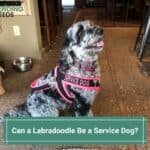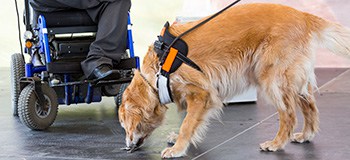Puggles can be service dogs in particular cases, although their dedication to following their noses and their tendency to view themselves as royalty may interfere with their work. Here’s what you need to know about Puggles as service dogs.
Can a Puggle be a service dog? The Puggle is not the typical service dog, but it might be a good fit for certain people and roles. The Puggle can be a service dog with a great sense of smell who will go anywhere with you, but they may be a bit distractible.
What are the pros and cons of using a Puggle as a service dog?
Here is what you need to know about the traits that make Puggles a good choice for certain service work and why they may not be a great fit for other jobs.
Do Puggles Make Good Service Dogs?
Puggles are adorable, outgoing, and generally happy to do anything for their person, so do they make good service dogs? The answer varies a lot depending on your individual Puggle and how much of the Pug and Beagle they express. It also depends on the job that you need your dog to do. Here are a few things to keep in mind.
Why Puggles MAY Make a Good Service Dog
Convenient size
Puggles are a great size for many kinds of service dog work. They are small enough that they could be conveniently carried but large enough that they can do small tasks for their owners.
They are certainly not large enough to offer any kind of support, and they should not be asked to walk for very long, but if you need a dog who can get you small things about the house or at stores, a Puggle may be a good choice.
Short coat
The Puggle’s short coat doesn’t shed too much and it doesn’t require much maintenance. If your disability may make it difficult to do significant grooming or if the cost of bringing a dog regularly to a groomer to have the coat clipped is too much, this easy, short coat may be attractive.
Outgoing, friendly nature
In general, Puggles are happy and outgoing dogs. This means that they will generally do well in most environments and with most people and dogs. They are unlikely to be either very distracted or aggressive towards other dogs or people, making them great dogs to bring everywhere with you.
Devoted to their person
Puggles are very likely to be devoted to their person, especially if they particularly take after the Pug side. While this doesn’t necessarily mean they are eager to please, it does mean that they are likely to be attentive to small changes about you and care enough about you to let you know.
This may make them a good fit for diabetes or seizure alert dogs.
A good sense of smell
All dogs smell much better than humans, but hounds are particularly adept at focusing and using their nose. Your Puggle will probably get a strong desire and talent for smelling from their beagle ancestry. If you need a dog who can smell changes in blood sugar or an oncoming seizure, a great sense of smell is a useful asset.
The tendency of beagles to be single-mindedly focused on a smell, combined with both the pug and the beagle’s food-obsession, can make a puggle very trainable to focus on the smells that suggest important changes in you.
Reasons Puggles MAY NOT Be As Good of a Service Dog
Beagles follow their nose
Beagles are well known for their desire to follow their nose. The focus that beagles have on smell can be called obsessive. After all, this is what they have been bred for.
The National Beagle Club recommends a fully fenced yard with a 5-foot fence and chicken wire or cement that is buried all around the fence line so that the dog can’t dig out. Beagles must always be walked on a leash because they will follow their nose into danger if you are not looking out for them.
Beagles are designed to be single-mindedly focused on scent. Their big ears even block their vision as they funnel scent into the nose.
Puggles are less likely to be single-mindedly focused on smells, but if your Puggle takes after the beagle parent, they may be much too distractible to be a good service dog. Remember, service dogs work all the time. They must always be there when they are needed.
Pugs may not want to serve you
There’s really no other way to say it, pugs were made to be royalty. They may not be willing to wait on you and attend to your needs. When they were bred in ancient China they were the prized possessions of emperors.
When they moved beyond China, they were prized by monarchs of Europe. While the pug is well known to be closely tied to their person, this doesn’t necessarily mean that they are eager to please.
Puggles don’t do well and hot or humid weather
Your service dog needs to be able to go with you anywhere you need to go. If you happen to find yourself somewhere hot or humid, your Puggle could be in danger.
Even if you carry your Puggle and make sure they have plenty of water, if they take after their pug ancestry they may have trouble breathing. The Puggle’s relative delicacy in relation to the weather may make it a less than ideal candidate for service dog work.
What Is a Service Dog?
A service dog helps a person with a disability participate fully in everyday life. They perform specific tasks in order to assist a person. Disabilities may be mental or physical.
For instance, a service dog trained to guide a blind person helps the person walk smoothly through the world and avoid dangers. A dog who is trained to help an autistic person who has fits may lay on the person to calm them.
Dogs may use their special skills to help people alert people as well. Dogs can smell so much better than us that they can actually smell changes in our body chemistry.
Dogs trained to alert people who have seizures or diabetes can predict the onset of a sugar crash or spike or an oncoming seizure and alert the person so that they can take measures to protect themselves or prevent the episode.
The distinction of a specific skill is important. The government makes a distinction between dogs trained to perform a specific task to assist their person and dogs who simply provide assistance by existing.
For instance, a person who suffers from panic attacks may be less likely to have a panic attack with their dog around, but that doesn’t make the dog a service dog. If, on the other hand, the dog can anticipate and react in a specific way to an oncoming panic attack, they would be qualified as a service dog.
Because a disabled person relies on their service dog in order to live everyday life, service dogs have many more rights than the average house pet. The government protects service dogs and their people from any kind of discrimination in housing or work. Places that generally don’t allow pets must allow service dogs.
Process of Becoming a Service Dog
Service dogs can be trained professionally or they can be trained by their owners. Most seeing-eye dogs for the blind come from special academies that breed, raise, and raise these dogs for the purpose.
On the other hand, dogs trained to alert to seizures or blood sugar drops can be any kind of dog that is very sensitive to their person.
The service that a service dog needs to perform overwhelmingly dictates what the process of becoming a service dog will be for them. Dogs who need to lead the blind must be trained to not only obey but intelligently disobey their owners in order to protect them.
Other dogs must always fetch when asked to. Still, others must be attentive to their owner’s moods and body chemistry.
Small Breed Service Dogs
Small breed dogs can assist as service dogs just as readily as big dogs. In fact, for some disabilities in which the dog’s ability to smell and anticipate is important, a small dog who can be carried near the face may be more effective than a dog who walks beside a person.
Naturally, small dogs are not effective for all types of service work, such as work that has significant physical demands.
In general, small dogs who are extremely sensitive and attached to their owners and don’t mind being carried much of the time are the best service dogs. Many people choose hypoallergenic breeds like toy or miniature Poodles, Bichon Frises, or Maltese.
Related Questions
Do Puggles make good therapy dogs?
While their sense of smell and perhaps entitlement may mean that Puggles are not always the perfect service dog, they do make amazing therapy dogs. Puggles tend to be outgoing, fun-loving, and adore everybody.
Their affectionate and endearing nature, along with their adorable wrinkly faces, make them a hit as therapy dogs.
Does my Puggle need to wear service dog vests or tags?
No service dog ever needs to wear anything that declares the service dog status, and nobody can ask you what your disability is. The only instance in which you may be questioned about why your dog is with you in a place where dogs are not normally allowed is for staff to ask what function the dog performs.
This is helpful so that they understand what’s happening should your dog try alerting them if you are having an emergency. You may choose to have your Puggle wear a vest while performing service dog work in order to avoid questions and people trying to pet your dog.





